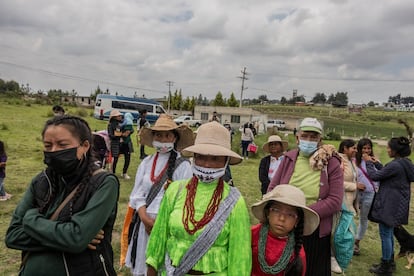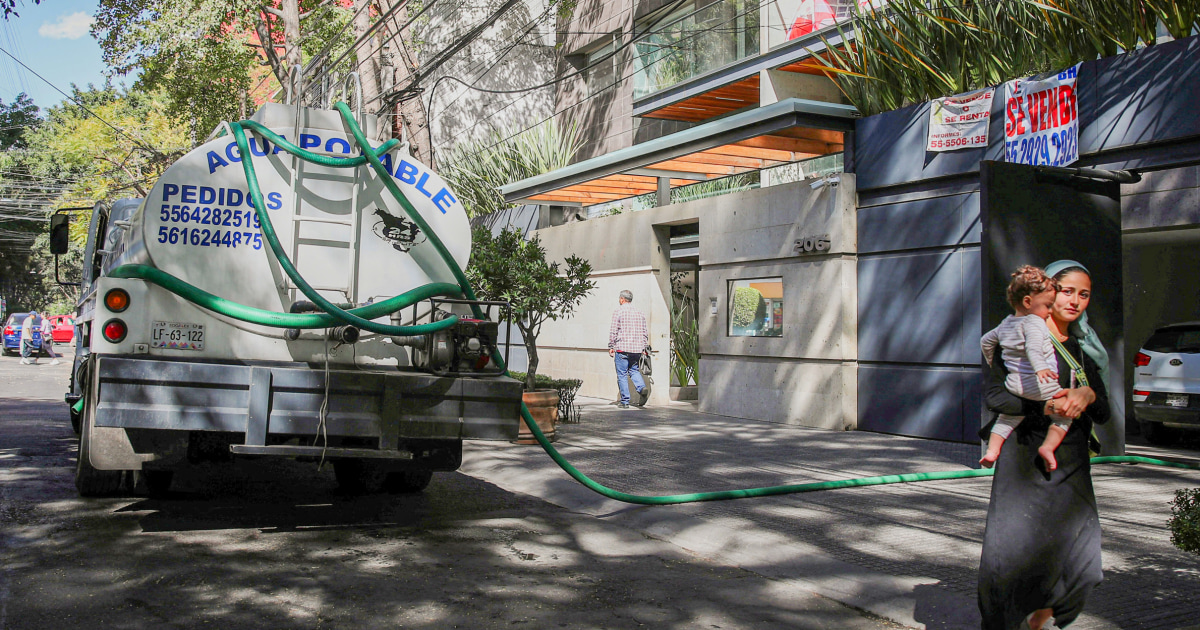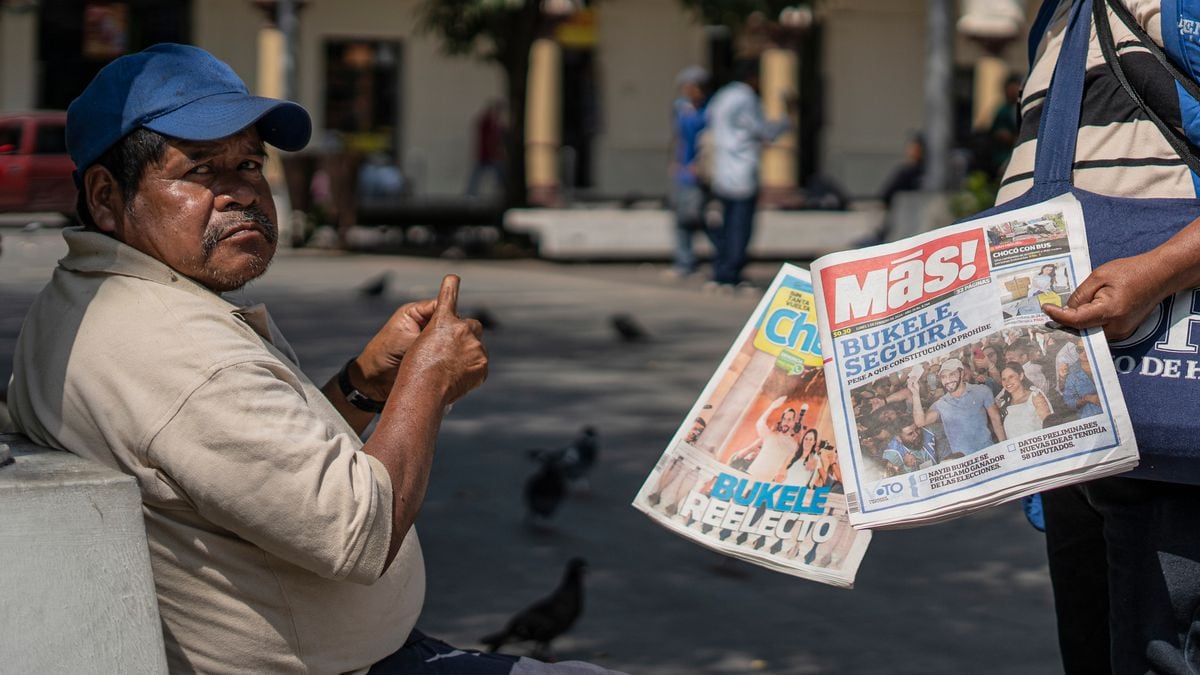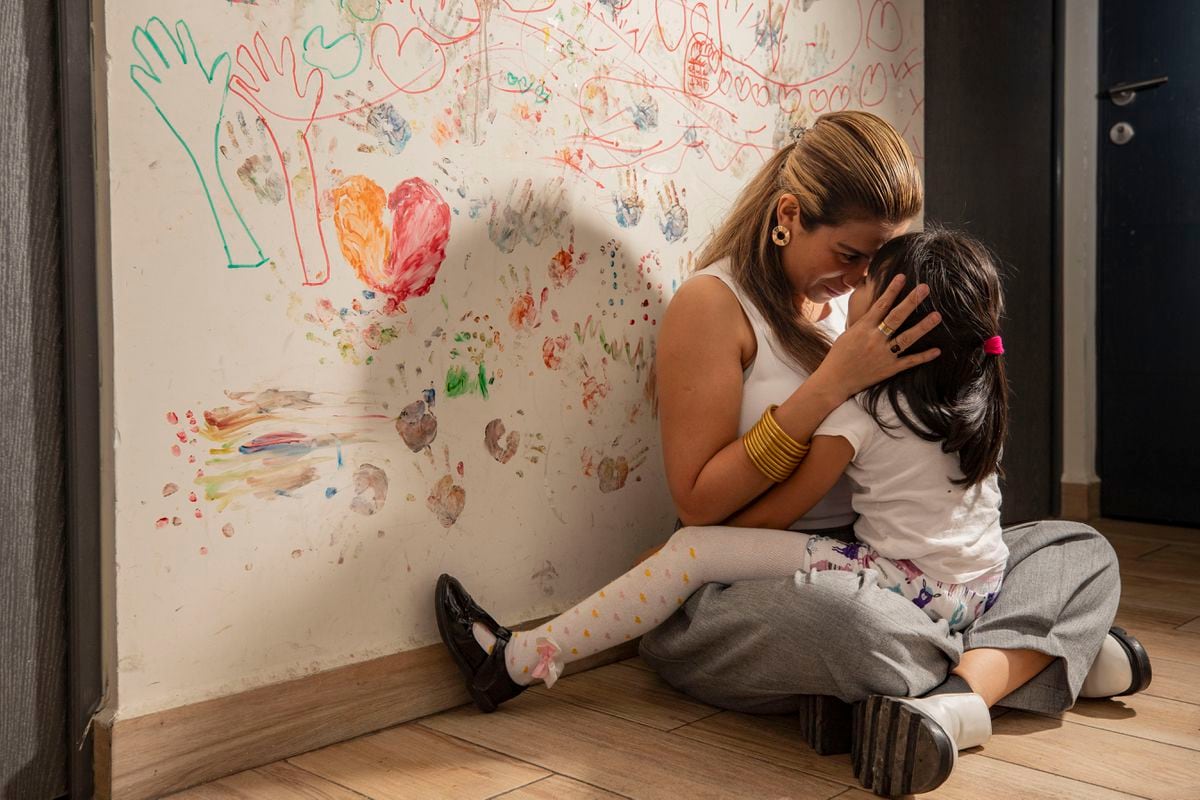The same hands that weed the cornfields and carry their newborn children now sort bags of beans and piles of tomatoes.
Some 70 Mazahua women from the community of El Quelite (State of Mexico) have arrived very early to receive the fortnightly pantry from the Network of Food Banks of Mexico.
“With this time there are two times that we receive the support.
Yes it helps us.
In my case, they gave me the expense and I had to see how it would reach me.
We are four at home, my husband, my two children and myself.
But with this I no longer buy rice that costs twenty-odd pesos, the same with tomatoes, I could buy that in oil,” says Citlali Chico Segundo, 22 years old.
The young Mazahua breastfeeds her three-month-old baby.
Her daughter, Melissa, five years old, sometimes plays alone around her mother and sometimes with the other children who have climbed a tree.
Meanwhile, Citlali waits with her empty bag for her turn to take the pile of tomatoes, the bouquet of onions, the bags of rice and beans, jars of mayonnaise, Moderna animal crackers, bags of donitas or Vive100 bottles that correspond to her.
A complete pantry for 87 pesos.
Citlali is part of the 28.5 million Mexicans who live in food insecurity in Mexico, a figure that rose 14% in the pandemic, according to figures released by the World Bank.
Shy, she answers questions from outsiders, with her gaze fixed on the grass.
“Here we have to take transportation to go buy groceries, which costs us about 300 or 500 pesos.
I have my baby, I have to go with my husband so that he can help me carry it.
And yes, things are expensive, no matter how cheap you want to buy, lemons and avocados have gone up a lot and right now, we have to buy diapers for the baby,” she says.
Her husband works in the fields.
Before her last pregnancy, she also went to the fields to clean the corn.
She was paid between 100 and 150 pesos per day per shift.
But now, with the newborn, it is impossible for her and all that remains is to try to save money at home.
Like her, the young Valeria Trinidad López, tries to make ends meet to feed her three children: a one-year-old baby, a three-year-old girl and the oldest eight years old.
“Yes, there are quite a few expenses and sometimes it is not enough for us.
My husband works so that we can pay for food, but we have been struggling a lot because sometimes it rains and sometimes it doesn't, and there is no harvest.
He plants corn, broad beans and beans.
We have to fight, but we have to find a way to get ahead with the maicito because if not, there is no way to eat all year round, ”she laments.
In the morning, a tea of herbs, the food is tortillas, beans, chips, mushrooms or quelites and at dinner, "whatever you can".
This is how Valeria sums up the family diet in her home.
During the pandemic, her husband lost his job and now the rains “have been missing”.
Her neighbors invited her to participate in the Food Bank program.
Otherwise, she affirms, she would have to go to Providencia, where she would spend between 300 and 400 pesos, an amount that she is not able to support each week.
In the same row, Alma Josefina Victoriano Cruz, tightly holding her daughter as she leans out to see the sweetened beverages that some company has donated and that now reach this community of less than 800 inhabitants, the majority indigenous, speaking Mazahua.
“Almost all of us are housewives and the fact that they turn to see here, those most in need, the truth is that we are grateful.
To acquire our food we have to travel to a couple of distant communities, sometimes on foot, sometimes by car.
The closest thing we have to here is the community of Providencia, an hour's walk away,” says the 39-year-old woman, dressed in a green dress, a necklace of hundreds of red beads, and a mask with embroidered hummingbirds.
The El Quelite community is one of those recently assigned to the fortnightly support of pantries granted by the Food Bank of the State of Mexico, Poniente.
The director of this Bank –one of the oldest in the country at 25 years old–, Alberto Canul Juárez, details that in that entity alone there are seven million people who suffer from food shortages.
Of this group, the civil association serves 130,000 people.
Every month, this bank mobilizes about 850 tons of food, 80% is donated by companies such as Moderna, Danone, Femsa and the rest is bought by the bank, especially the products that must go in the food packages for reasons of quality standard and that companies such as beans or vegetables do not donate.
Despite the fact that this bank delivers between 2,500 and 3,000 food packages daily in some 55 communities, the manager acknowledges that they are not enough to cover all applicants.
For example, the south of the State.
“One of the areas that we are not serving is the southern part of the State of Mexico, due to lack of food, distance and insecurity.
The entire southern zone of the State of Mexico is a hot zone, very close to Guerrero and Michoacán which, unfortunately, has invaded a lot of crime and we cannot get there because our drivers are in danger.
The southern area of the State of Mexico is a very good agricultural area, and it is one of the most productive areas, and we have some donors there, but we try not to bring that product anymore because of the risk,” acknowledges the manager.
Mrs. Alma Josefina Victoriano Cruz stands in line to receive a supply of food in the community of El Quelite. Hector Guerrero
Canul Juárez admits that due to the pandemic we had many requests from people who lost their jobs, people who at one point had to close their business and who are requesting us, unfortunately, due to the lack of food, we have not been able to increase it, we have the same average from 2021 to 2022. In a quick calculation, the manager estimates that in this area there are about 4,000 families that they have not been able to reach.
Mariana Jiménez, director of Strategic Alliances and Social Investment of the Network of Food Banks of Mexico (Red BAMX) admits that there is a huge logistical challenge to bring fruits, vegetables, bread, milk and other products to the farthest corners.
"The food is there, there are more than 23 million foods that are being lost and wasted every year in our country, that is what there is for us to rescue it, however, our food banks do not have sufficient logistics capacity to go and collect all that food.
Obviously, this implies a significant logistical cost, an operating cost that today with the rise in fuels increases much more”, she asserts.
Ignorance.
That word resonates with Jiménez when he is asked why in Mexico more than 20 million foods are left to rot and thrown away if there are more than 20 million mouths that can be fed.
The directive is direct when it points out that the economic, social, environmental, economic impact and the tax benefit that companies obtain by becoming donees are still ignored in the country.
With runaway inflation and the Russian conflict in Ukraine with no end in sight as a backdrop, the director acknowledges that a complex and difficult horizon lies ahead.
“Today we have a problem of availability, the problem is the prices of basic foodstuffs due to inflation and the armed conflict (of Russia in Ukraine), if this situation is not reversed we will have a problem of access, and then it will not be to have food.
With all the efforts we make, with the 54 food banks, we are barely serving 6% of the population that lives in food insecurity, they are more or less about two million Mexicans, ”she says.
Although Jiménez points out that so far inflation has not had an impact on the prices of the products that the Food Bank is forced to buy, the director does not rule out reviewing the fee they charge for groceries to counteract the rise in prices.
“We have seen an increase in the prices of basic foods: beans, sugar, oil, pasta.
It depends on the months, the State.
To ensure the sustainability of the cause and its operation, it would have to be reviewed (the quota), however, we are also triggering strategies to diversify our sources of economic income and donations in kind”, she concludes.
subscribe here
to the
newsletter
of EL PAÍS México and receive all the informative keys of the current affairs of this country





/cloudfront-eu-central-1.images.arcpublishing.com/prisa/JSB4TF3SMVA2JHJDKFBTGEF74I.jpg)



